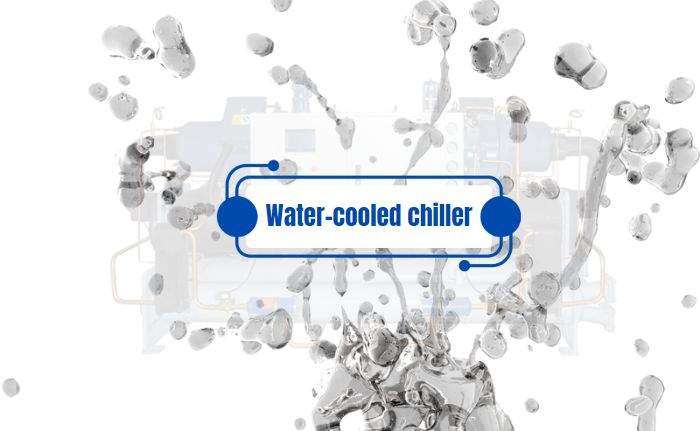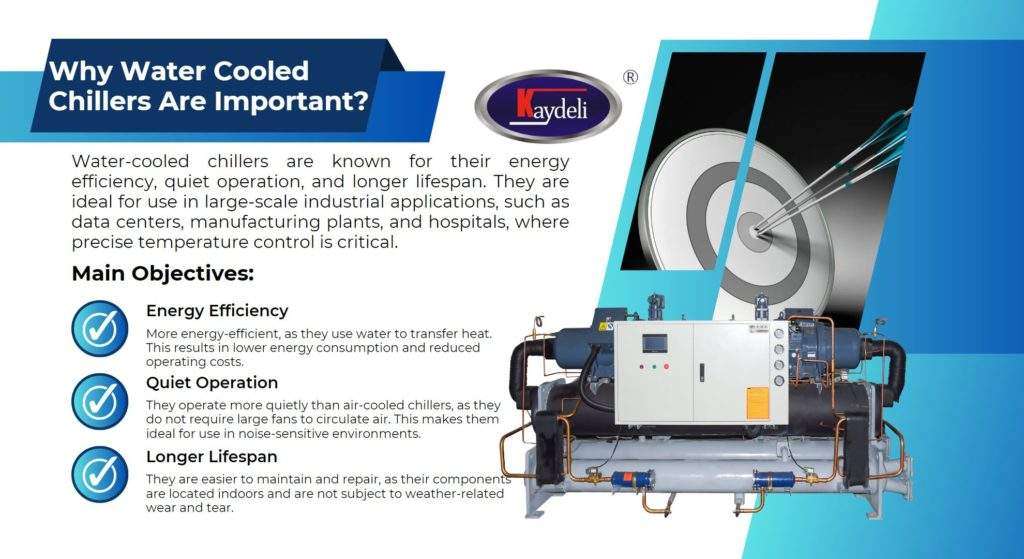Why water cooled chillers are important?
Water-cooled chillers play a critical role in the cooling industry, providing precise and efficient cooling for a wide range of industrial applications. These systems use water as a coolant to remove heat from processes and equipment, making them an ideal choice for large-scale cooling needs.
One of the key benefits of water-cooled chillers is their energy efficiency. Compared to air-cooled chillers, water-cooled systems use water as a more efficient heat transfer medium, resulting in lower energy consumption and reduced operating costs.
This makes them a cost-effective solution for cooling large industrial processes, such as data centers, manufacturing plants, and hospitals.
Another benefit of water-cooled chillers is their quiet operation. Unlike air-cooled chillers, which require large fans to circulate air, water-cooled systems operate quietly, making them ideal for use in noise-sensitive environments, such as hospitals, schools, and residential areas.
Water-cooled chillers also have a longer lifespan than air-cooled chillers. Because they are not exposed to harsh outdoor conditions, such as extreme temperatures, rain, and snow, they are less prone to wear and tear.
Hence, they are easier to maintain and repair, as their components are located indoors and are not subject to weather-related damage.
Water-cooled chillers are also highly customizable, making them a versatile choice for many different cooling needs. They can be designed to handle a wide range of cooling loads and can be customized to meet specific requirements, such as temperature control and humidity control.
For industrial settings, precise temperature control is critical for ensuring optimal product quality and equipment performance. Water-cooled chillers provide greater thermal stability and consistency than air-cooled systems, allowing for improved process control and reduced downtime.
Water-cooled chillers are widely used in a variety of industries, from food and beverage production to pharmaceutical manufacturing to HVAC systems. In the food and beverage industry, water-cooled chillers are used to maintain precise temperatures during the fermentation process of beer and wine production, as well as in other food processing applications.
As for the pharmaceutical industry, water-cooled chillers are used to regulate the temperature of sensitive equipment and samples, ensuring accuracy and reliability in research and testing.
In HVAC systems, water-cooled chillers are used to cool buildings, providing efficient and consistent temperature control.
One of the primary advantages of water-cooled chillers is their ability to handle large cooling loads. They are capable of providing cooling to multiple processes and equipment simultaneously, making them a versatile and reliable choice for industrial applications.
Additionally, water-cooled chillers can be designed to operate with a variety of different refrigerants, allowing them to meet the specific needs of different applications.
Water-cooled chillers are also a more sustainable choice compared to air-cooled chillers. Because they use water as a coolant, they have a smaller environmental footprint and produce fewer greenhouse gas emissions.
In conclusion, water-cooled chillers are an important component of the cooling industry, providing efficient and reliable cooling for large-scale industrial processes and equipment. Their energy efficiency, quiet operation, longer lifespan, and customizable design make them a versatile and cost-effective solution for a wide range of cooling needs.
Contact Us: If you have any questions or would like to learn more about water-cooled chillers, feel free to contact us. Our team of experts is ready to provide you with the information you need to make the best cooling decisions for your industrial application.


